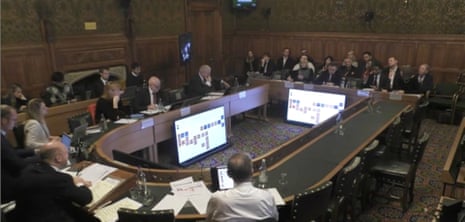Introduction: Bond fund giant Pimco warns of ‘hard landing’ for UK economy
Good morning, and welcome to our rolling coverage of business, the financial markets and the world economy.
The ghost of a future recession is haunting the UK this morning, with less than a fortnight until the new year.
One of the world’s biggest active bond fund managers has dampened the festive mood, warning that the UK is at high risk of a serious economic downturn in 2024.
Daniel Ivascyn, chief investment officer at Pimco, is predicting the UK will suffer greater economic strain than the US economy next year, when both countries will be holding general elections.
Ivascyn told the Financial Times that higher interest rates are having more of an impact on British consumers than their American counterparts.
“In the case of the UK — a smaller, open economy, with a consumer that’s feeling the brunt of central bank policy far more than their US counterparts — you just have a higher probability of more significant economic deterioration.
“We do think there’s potentially more hard landing risks.”
Ivascyn also warns that Europe’s economy could also struggle in 2024, adding that both the UK and Europe risk “a more significant deterioration” than the US, whose economy had held up well in 2023. More here.
Both the US and UK central banks have left interest rates on hold in recent months – at 5.25% in the UK, and a 5.25-5.5% target range in the US.
Optimism has been growing in recent weeks that the US will pull off a tricky ‘soft landing’ – bringing down inflation without triggering a recession [corrected, thank you kind reader].
That would allow the Federal Reserve to ease policy in 2024, with the markets pricing in as many as six quarter-point cuts to US interest rates next year.
But the Bank of England continues to push back against market expectations that it might cut interest rates by over one percentage point next year.
Last week, accountancy and business advisory firm BDO reported that UK business confidence has fallen three months running, driven by gloom in the services sector. BDO’s optimism index fell to its weakest point since April, with rising wages forcing firms to cut back on hiring.
Worryingly, the UK economy shrank by 0.3% in October, suggesting it weakened towards the end of 2023.
On Friday, updated GDP data will show how the UK economy performed in July-September. It will probably confirm that GDP stagnated, but there is chatter that the data could be downgraded to show the economy shrinking in Q3.
Looking more widely, analysts at Oxford Economics predict that global GDP growth will slow to just 2.1% next year – a weak outcome even by post-global financial crisis standards.
They add:
However, it would still amount to a soft economic landing after the aggressive monetary policy tightening over the past couple of years.
Also coming up today
New eurozone inflation data is expected to confirm that consumer prices rose more slowly in November, to a 28-month low. The initial estimate was that the eurozone CPI rose by 2.4% over the last year, as inflation cooled.
In the UK parliament, the Business and Trade Committee is holding an evidence session examining the use of private equity in the retail sector. Asda co-owner Mohsin Issa will be among the witnesses.
The agenda
-
10am GMT: Eurozone inflation report for November (final estimate)
-
10am GMT: Business and Trade Committee session on use of private equity in retail sector
-
11am GMT: CBI Industrial Trends survey of UK manufacturing
-
1pm GMT: Bank of England deputy governor Sarah Breeden: Speech at the IIF talking policy series
Key events
There’s been a small increase in the number of European investors who fear the global economy will hit trouble next year.
Only 23% of respondents to Bank of America’s latest poll see a hard landing as the most likely outcome for the global economy over the next twelve months (up marginally from 21% last month).
BofA’s latest European Fund Manager Survey found:
-
A net 35% think monetary policy is too restrictive in Europe, the highest since 2009, with 88% expecting a growth slowdown
-
Only 23% expect a hard landing for the global economy, with 62% seeing a strong consumer as the main reason for resilience
-
68% see upside for EU equities in 2024, though a majority expects near-term weakness for market and cyclicals after the rally
Good news on the inflation front.
UK manufacturers are expecting to raise their prices at a slower rate than earlier this year.
The latest industrial trends report from the CBI shows that expectations for average selling price inflation slid to the joint weakest since February 2021, matching October 2023’s reading.
Expectations for selling price inflation eased in December, and were on par with the long-run average. Selling price expectations were the joint weakest since February 2021. #ITS pic.twitter.com/f47CIsEmVt
— CBI Economics (@CBI_Economics) December 19, 2023
The latest CBI Industrial Trends Survey found that manufacturing output volumes were unchanged in the final three months of the year. Firms expect output to rise marginally in the first three months of 2024. #ITS pic.twitter.com/3lytERrdeC
— CBI Economics (@CBI_Economics) December 19, 2023

Mark Sweney

The publisher of the Daily Mail has confirmed it is to launch a paywall giving access to up to 15 MailOnline articles each day, my colleague Mark Sweney reports.
The new service, which will launch at the end of January, will be made available through the UK website and app, and will cost a “small monthly fee” although the exact price has not yet been revealed.
The publisher said that the service would be known as Mail+, previously the name of the digital edition product of the Daily Mail and Mail on Sunday newspapers that was launched in 2020, but stressed that the “overwhelming majority” of stories would remain free.
The amount of content represents just a few percent of the 1,500 articles that the MailOnline publishes on a daily basis.
Content set to be put behind the paywall include investigations, show business and royal exclusives, expert health, money and travel advice, as well as opinion pieces penned by the newspapers’ columnists.
MailOnline will remain free to access outside the UK.
Readers who already subscribe to Mail+ editions, which are estimated to total about 160,000 according to Enders Analysis, will be given free access to new MailOnline subscription service.
Energy firms can challenge sale of collapsed provider Bulb at Court of Appeal
British Gas and E.On have been given the green light to continue their legal challenge over the sale of collapsed energy firm Bulb to a rival provider at the Court of Appeal, PA Media reports.
The two suppliers previously claimed the Government’s handling of the allegedly “unfair sale process” led to decisions “to commit billions of pounds of taxpayer money to facilitate the acquisition of a failed business” by Octopus Energy.
The two businesses, alongside Scottish Power, brought legal action against ministers earlier this year, claiming the decision-making process was “flawed and unlawful”.
But the High Court dismissed their case in March, concluding it had been brought with “undue delay” and was “not… reasonably arguable”.
At a short hearing in London on Tuesday, appeal judges granted British Gas and E.On permission to challenge the earlier ruling.
Scottish Power previously said it would not appeal against the High Court judgment.
Lord Justice Underhill, sitting with Lord Justice Phillips and Lady Justice Whipple, said British Gas and E.On’s appeal case has “a real prospect of success” and they should be allowed to argue it in an estimated three-day hearing at a later date.
Q; How will Asda cope when the Issa brother’s private equity partners, TDR Capital, decide to cash in and leave?
Mohsin Issa says TDR haven’t given any indication that they want to sell their 45% shareholding.
He says TDR are hands-off owners, but provide data capabilities and procurement facilities.
And that’s the end of the session.
MPs then heard that Asda has been looking for a new CEO for the last 18 months.
Mohsin Issa explains that he is ‘best qualified’ to lead the business at the moment, citing his experience in untangling IT systems, which is valuable as Asda splits away from former owner Walmart.
Q: Why are you finding it difficult to find a CEO?
Issa says he wants to find the right candidate.
HR chief Hadley Tatum says Asda have met with several candidates, but as they are “continually changing the business” they identify other attributes that the ideal candidate needs.
Q: You’ll never hire anyone then?
Tatum denies that, saying Asda is now clearer about its vision following recent deals.

Ian Lavery MP tells Asda-owner Mohsin Issa that the Financial Times has described the capital and ownership structure of Asda as a “complex structure that involves offshore vehicles and financial engineering”.
Q: Why is the structure so complicated?
The structure is on display on screens at today’s committee hearing – and Issa insists it isn’t complicated, and in fact is normal for a supermarket of Asda’s size.
Q: So the Financial Times’s description is inaccurate? Is it wrong?
Issa channels Francis Urquhart, and says he couldn’t possibly comment.
Lavery presses the point…..
Issa says he disagrees with the FT’s description (but doesn’t actually claim it’s wrong).
Charlotte Nichols MP tells Asda’s management that a worker at the supermarket has passed details of an edict, sent from Asda’s head office, saying that MPs and councillors are not allowed to carry out food bank collections in store.
Asda’s chief people and corporate affairs officer, Hayey Tatum, says she doesn’t recognise this instruction, but will follow up on this afterwards….
The business and trade committee are very unimpressed that Asda’s owners are calling some parts of their business ‘phantom’.
Conservative MP Mark Pawsey asks Asda’s general council, Helen Selby, if she advised they did it.
Selby says the phantom entities were set up at shareholder level. She doesn’t read anything into the use of the word phantom, despite the negative connotations cited by Charlotte Nichols MP.
Q: Isn’t it an extraordinary word to use in a holding company?
Selby says she is comfortable with it, as nothing is being hidden in these businesses.
Labour MP Charlotte Nichols then quizzes Asda about the complicated structure created since the takeover of the supermarket.
Nichols points out that several units (including Bellis Phantom Holdco) include the world ‘phantom’.
Is it really a good PR move to use the word ‘phantom’ – which means “not real, illusory, a figment of the imagination, deception, a lie…”, she asks.
CFO Michael Gleeson insists there is no operational benefit from being registered in Jersey, and that all those units are registered to pay corporation tax in the UK.
Q: So why register in Jersey at all? Is it for transparency reasons? (ie, to avoid it).
Gleeson explains it can make subsequent corporate restructerings earlier.
Some transactions could create a stamp duty exposure if a company is registered in the UK. It’s possible to avoid it, but it’s quicker to be listed in Jersey.
Back at the business and trade committee….
Q: Should the committee concerned by the capital and debt structure of Asda?
CFO Michael Gleeson says the company is cash-generative, pointing out that half of the bill for Co-op’s petrol business was paid in cash. The other half was covered with a £200m loan, which was then paid off with cash generated by the business.
Asda co-owner Mohsin Issa insists that the business is “highly cash generative”.
He says leverage fell between the start of the year and the end of September, and is on track to fall even further by the end of the year.
Issa says:
What I would say is that the debt leverage at the start of the year was at 4.2 times, that has gone down to 3.8 times and that trajectory is to go down even further by the end of this year.
“At the same time, we are investing in colleague pay, customer pricing and loyalty. The business in highly cash generative.”
Reuters: FCA has concluded investigation into Odey Asset Management
Newsflash: The UK Financial Conduct Authority has concluded its investigation into Odey Asset Management (OAM) and “will not take any action,” according to an investor letter from the hedge fund, Reuters reports.
The letter from OAM also said that the last client relationship of the hedge fund formally ended on December 12.
The FCA launched its investigation into Odey last summer, after he faced allegations of sexual misconduct. Odey has denied any misconduct.
The FCA was examining if Odey was a fit and proper person to work in financial services, and if he had broken the FCA’s conduct rules relating to integrity and acting with due skill, care and diligence.
Asda facing £30m rise in debt costs in February
MPs then try to get a straight answer as to how much debt is on Asda’s books.
CFO Michael Gleeson explains that Bellis Acquisition (part of Bellis Finco, the parent company owned by the Issa brothers and private equity firm TDR) owes £3.7bn.
There is another £500m on the books of Bellis Finco (another peg in the ownership structure).
Liam Byrne MP digs deeper into the structure – how about Bellis Topco, how much debt is there?
Gleeson explains that Bellis Topco has £200m equity, and shareholder loan of £580m.
Q: So, is that total debts of £4.7bn?
No, £4.2bn, Gleeson insists – he doesn’t count the shareholder loan to Topco.
Q: What impact will higher interest rates have?
Gleeson says that most of the £3.7bn loan is at a fixed date until February 2026. However, a £700m chunk of it will float at the end of February 2024.
The £500m on Bellis Finco’s books is also fixed, and matures in February 2027.
Q: What impact will higher interest have on that £700m loan?
The interest payments will “certainly increase” when it floats, Gleeson confirms.
He estimates that interest payments will rise by around £30m, if the rate increased by four to five percentage points.
Asda then insist to MPs that their accouts are clean, as they are quizzed about a potential gap of £1.7bn in their reported operating costs.
Mohsin Issa insists there is no gap, and that this £1.7bn is due to the operating expenses with running Asda’s stores.
Michael Gleeson, Asda’s chief financial officer, explains that UK accounting standards require Asda to report the total spent on wages, depreciation of its assets, and the cost of its good sold.
That total won’t include other significant costs, Gleeson says, such as business rates, property maintainance, and energy and utility costs. Add in marketing costs, the cost of running IT systems, and insurance, and that gives the £1.7bn difference in Asda’s operating costs.
Back in July, Issa was unable to explain to the committee why there was a £1.7bn gap between the operating costs declared by Asda, and a breakdown of those operating costs (which are subtracted from revenues before tax is calculated).
Mohsin Issa defends running of Asda
Asda’s co-owner, Mohsin Issa, is now before MPs.
Business and trade committee chair Liam Byrne tells Issa that he has concerns, having read the transcript of Issa’s previous appearance at the committee.
Byrne reminds Issa that Asda employs 140,000 people in the UK, and was bought by TDR Capital and billionaire Blackburn-based brothers Mohsin and Zuber Issa in 2021 in one of the biggest leverage buyouts in recent years.
Your debts are very large, and very unclear – somewhere between £4bn and 7.5bn, Byrne says, with debt servicing costs set to rise sharply as interest rates stay higher for longer.
Ian Lavery MP then points out that the acquisition of Asda brought a debt of over £4bn onto its books. Since then, borrowing conditions have deteriorated – leading to two credit rating downgrades.
Q: Has it been a really difficult time since the acquisition?
Mohsin Issa defends his running of Asda, saying that the company has “chosen to invest in customers”, including spending £140m on price cuts to help with the cost of living crisis, at the expense of profits.
He says Asda staff have received two pay rises – 8%, and 10%, costing £264.8m, plus £60m into pay for logistics workers.
He insists:
We chose to invest, and that’s why we were downgraded.
Credit rating agencies were also concerned by Asda’s lack of convenience stores, Issa adds, which is is addressing through acquiring grocery retail sites from Co-op.
However… when Fitch downgraded Asda from “stable” to “negative” in September 2022 it pointed to the extra £200m of debt that Asda will use to help finance the Co-op deal.
The GMB union’s Nadine Houghton also argues that the UK’s competition watchdog should take a closer look at private equity deals.
Houghton tells MPs that the CMA should be given an expanded role, so it can scrutinise private equity deals to ensure they are being done in the interest of the public, and also the people who work for them.












